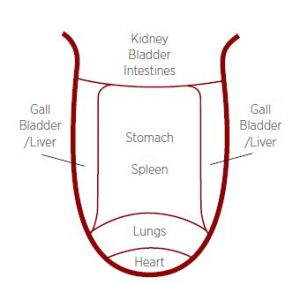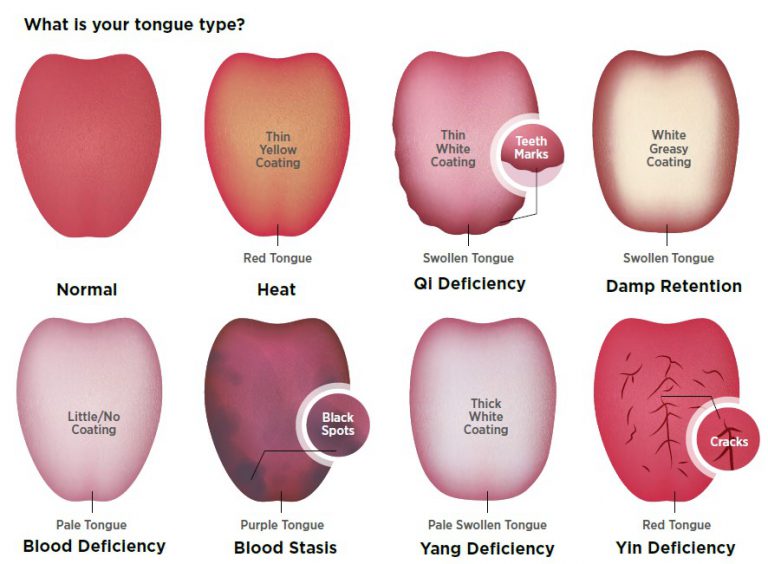The appearance, colour, and condition of your tongue say a lot about the state of your health.
Sickness is caused by the imbalance of qi (气) and blood (血), as well as yin (阴) and yang (阳) in the body.
TCM diagnosis methods
In Traditional Chinese Medicine (TCM), four unique techniques are used to diagnose and treat the underlying problems of the sickness, and they are:
Making observations (望)
Listening to breathing (闻)
Asking about the individual’s symptoms (问)
Taking their pulse (切)
TCM tongue diagnosis
In TCM, observing the condition of the tongue is one of the most important techniques the physician uses when they examine their patient. This is because in TCM, the tongue is connected to all the zang (脏) and fu (腑) in our body via meridians (经络). Studying the tongue, therefore, provides invaluable information on someone’s health and the balance of their body.
The diagram below shows how the different areas of the tongue map to or are connected to our respective zang (脏) and fu (腑).


The TCM physician uses three basic tongue observations to analyse an individual’s health conditions.
The colour of the tongue
- Red tongue: Excessive heat in the body. Common symptoms include inflammation, fever, and migraine.
- Pale tongue: Cold in the body. Common symptoms include body weakness, fatigue, and anaemia.
- Purple or dark tongue: Blood stasis or poor blood circulation in the body. Body aches are a common symptom.
The shape and size of the tongue
- Swollen tongue: A swollen tongue with teeth marks indicates dampness and spleen deficiency. It is a common symptom of stomach problems.
- Small or thin tongue: This indicates a deficiency of qi (气) and blood (血). Common symptoms are dizziness and fatigue.
The coating on the tongue
- Thick white coating: This indicates dampness-cold phlegm.
- Thick yellow coating: This indicates dampness-heat phlegm.
- No coating: This indicates the deficiency of yin (阴). One may experience night sweats.
The tongue can show various combinations of mapping, colour, shape, and coating. For example, a tongue may be pale in colour with a thick white coating in the middle. Based on the location of this white coating, the tongue map shows that the problem is related to the stomach. It is likely that the patient suffers from dampness-cold or a yang (阳) deficiency in their digestive system.
In order for your TCM physician to get the best tongue diagnosis, do take note of the following, ahead of your tongue inspection:
- Do not remove the coating of the tongue when you brush your teeth in the morning.
- Avoid taking sweets, as well as coffee and tea before the tongue inspection.
- When your TCM physician is inspecting your tongue, do not stick it out for more than 10 seconds, so as to avoid changing its colour.
Physician Jun Negoro
Traditional Chinese Medicine
Thomson Chinese Medicine (TCM Paragon Medical Centre) and 1 other
English, Mandarin
Alliance MediNet

